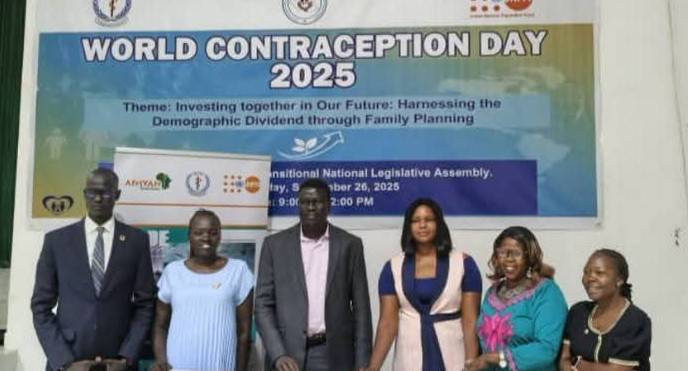
Lawmakers and policymakers have been urged to make family planning a national priority as South Sudan joined the global community in commemorating World Contraception Day.
Stakeholders say urgent action is needed to improve access to services and information, which remain limited for many women and young people across the country.
At an event held at the Revitalized National Legislative Assembly in Juba, UNFPA South Sudan Midwifery Specialist Gillian Butts–Garnett appealed to legislators to put reproductive health at the heart of national decision-making.
“Hon. Parliamentarians and decision makers, I urge you to make family planning central to our laws, policies, and budgets,” she said. “Ensure every young woman has the chance to finish school before she begins motherhood.”
Experts warn that the lack of access to reliable contraceptive services and information contributes to high rates of adolescent pregnancies, unsafe abortions, and maternal mortality.
Dr. Mading Michael, Director General for Reproductive Health at the Ministry of Health, underscored that family planning is a matter of public health and national development, not foreign influence.
“Family planning is not a western agenda, it’s not something new — it promotes the well-being of the mother,” he said.
“There are unsafe abortions happening in this country, which is a nightmare. With proper access to information, we can prevent unwanted pregnancies among adolescents. As we commemorate World Contraception Day, let us, as parents, establish dialogue with our children about sexual and reproductive health and rights (SRHR).”
With support from UNFPA, the Ministry of Health is expanding access to family planning services across the country. Efforts include community outreach, awareness campaigns, and equipping health facilities to offer safe, affordable, and youth-friendly services.
This year’s global theme, “Breaking Barriers, Building Bridges – Contraception Access for All,” highlights the importance of overcoming stigma and policy gaps that limit access to reproductive health services.
In South Sudan, the national commemoration was held under the banner: “Investing in our shared future: Harnessing the Demographic Dividend Through Family Planning.”
Advocates say investing in family planning is not only a health intervention but also an economic and social imperative.
Access to contraception helps young women complete their education, participate in the workforce, and contribute to national development, creating a more prosperous and equitable society.

